5 Ways a Tater-Hater Convinced Women to Lift Weights
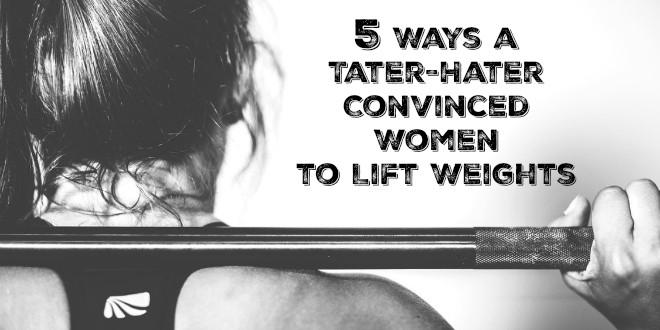
[caption id="attachment_20384" align="alignleft" width="367"]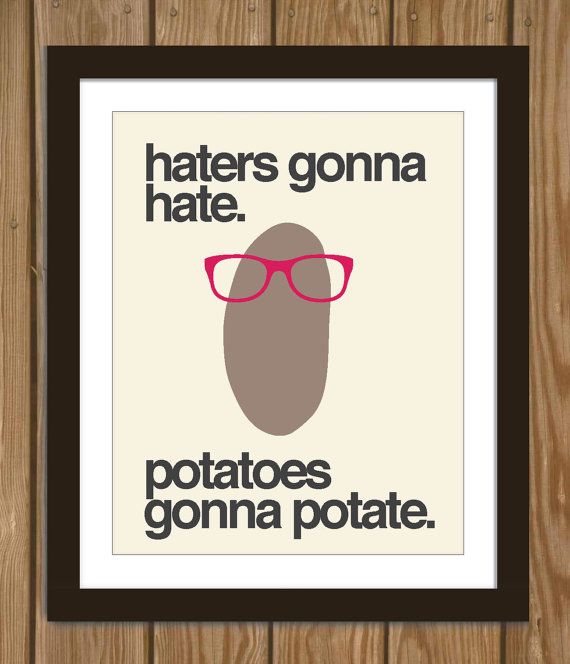 Image Credit: Funnyquotesimg.com[/caption]
Image Credit: Funnyquotesimg.com[/caption]
Wherever you are in your training career, at some point you’ll need to make the tough decision about whether the humble spud ( aka tater, tuber, po-teh-toe, po-ta-toe, etc ) is your friend or foe. You’ll need to consider whether these comforting carbohydrates will be part of your goals for general fitness, strength, power or endurance. Or will they be demonized and cast out, to be forever shunned?
Make this decision carefully because once you convince yourself of your position, it can be very hard to change your mindset.
As a self-confessed and long-term tater-hater, it took much effort to move to a better place. In this new and happy place baked potatoes (but only sweet potatoes) are happily chomped (but only after a tough training session when glycogen stores have been depleted), without much second thought (except for a momentary pang of guilt). I only said it was a happy place. I never said it was a simple and straightforward place.
To anyone who has never been carbohydrate phobic, you might not think this is progress. But I can tell you it is, and it was made possible by a group of women aged in their 40s and 50s who were learning to weight lift for the first time.
We all go through phases of trying different things. It’s part of life and learning how stuff works, regardless of where we live, how old we are, how much money we make, and how many Twitter followers we have.
[caption id="attachment_20380" align="alignright" width="360"]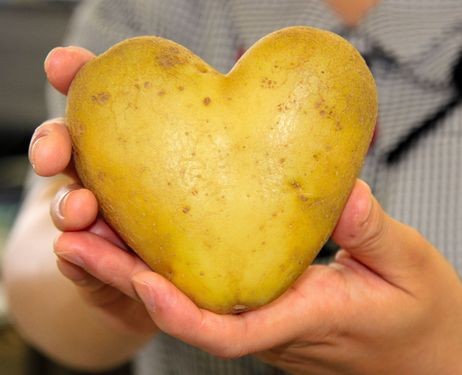 The Love and Hate Relationship with Potatoes[/caption]
The Love and Hate Relationship with Potatoes[/caption]
Conventional wisdom about carbohydrate consumption is diverse. Of the many paths available, some of us move further along the low carbohydrate and high protein path than we originally planned, without even realizing. We believe that we’ll easily shed fat and that our appetites will be reduced. We might set an arbitrary limit such as staying under 100 grams per day. What better way to achieve this than by giving up potato, pasta, rice and bread? For me, I focused on potatoes.
I made it easy on myself by believing the doctrine that:
...this is a polite way of saying potatoes are not only filling, but they also make you fat. When you eat potatoes do you feel full? Potatoes make you feel full because they contain resistant starch. Also, potatoes in their most often consumed form of french fries will gram for gram have more calories than bread or rice.
...did you know potatoes can be poisonous? The green patches you sometimes see contain solanine, which is a natural glycoalkaloid that occurs with exposure to light. It’s a bit hard sometimes to tell if they’re green under all that dirt. Maybe you should just avoid them all together.
...this could fall into the group of first world problems, and I should be grateful to have ready access to food when many people in world don’t. While I don’t peel many other vegetables, it just feels right to make an exception for potatoes.
...if you’re monitoring your macronutrients and aiming for a certain breakdown of proteins, fats and carbohydrates, potatoes can easily blow out your balance, especially if you don’t have enough information to adjust as needed.
On review I’m sure you’ll agree these are very lame excuses on which to base an important nutritional decision. The only one that might get some sage nodding from you is the macronutrient argument, but only if you’re also already riding the train of macro monitoring, and only while we’re making polite conversation between sets at the gym.
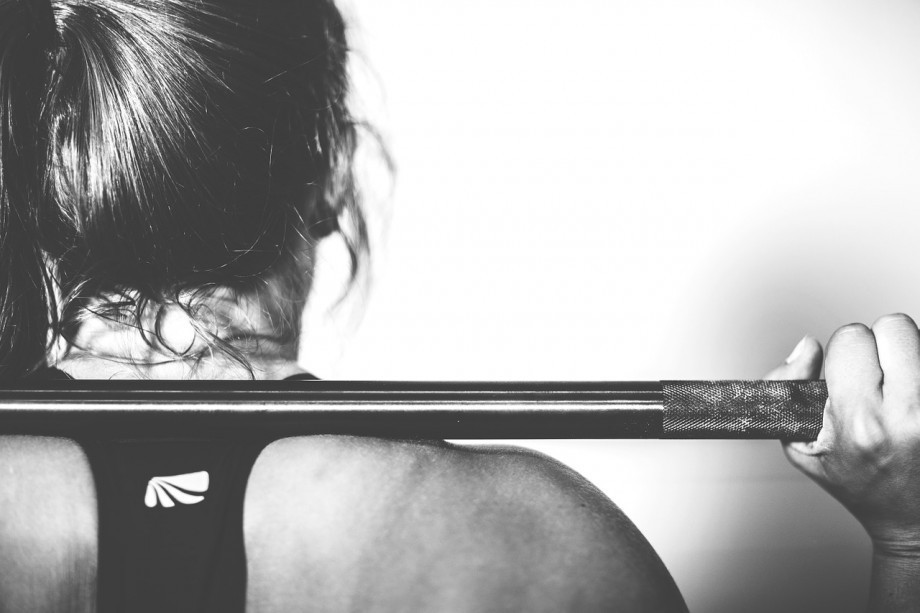
Quite unrelated to the topic of potatoes, I recently started training a small group of women in their 40s and 50s. These Lovely Ladies had never been in a gym, let alone had the tough choice of whether to deadlift or squat on any particular day. These were women who were strong in so many ways, but were heading down the path of possibly not being able to be physically strong enough in the future to keep up with their families, their careers, or the lives they wanted to lead.
After our initial discussions about goals, training histories, and contraindications to training, we started to talk about whether they’d be interested in moving chunks of metal around for no other reason than to get strong and feel awesome. Their responses were the same I’d heard so many times before:
Though I was very impressed with the conviction that the Lovely Ladies held their points of view, it was very disappointing to hear the same stories yet again.
[caption id="attachment_20386" align="aligncenter" width="618"]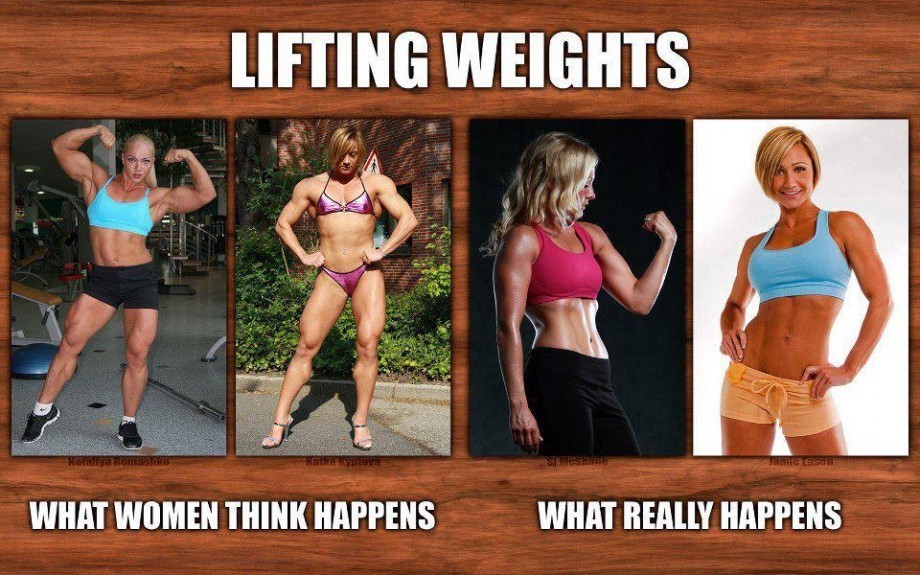 Image Credit: Meggorun.blogspot.ca
[/caption]
Image Credit: Meggorun.blogspot.ca
[/caption]
But then I realized that their convictions against weight training were wrong only according to my point of view. Could my convictions against potatoes be just as wrong?
These Lovely Ladies changed my life when I realized their reasons for not weight lifting were almost exactly the same as my reasons for not eating potatoes.
Enlightenment that results from a changed point of view can be rare, and when it happens it’s often useful to apply what you’ve learned to other parts of your life. Yes, perhaps to things more important than whether you eat potatoes, or whether you pick up chunks of metal for a couple of hours a week. These are the 5 things that the Lovely Ladies taught me and that everyone needs to know to make fitness changes.
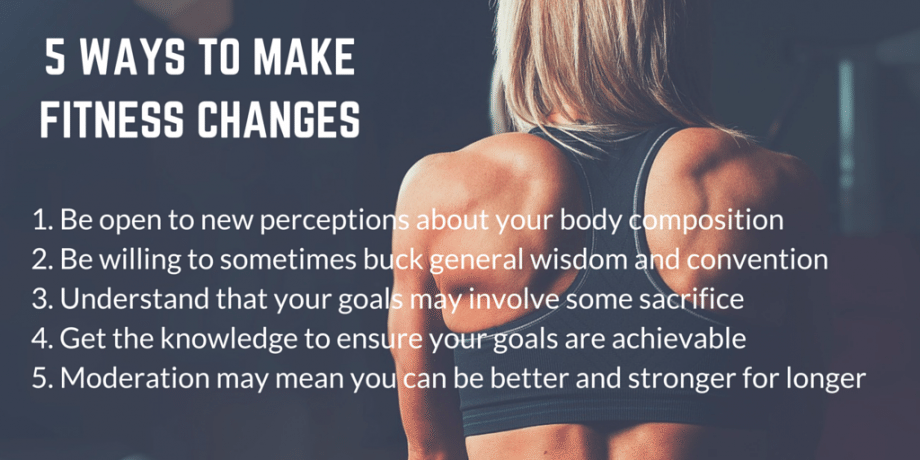
Know that you get to decide what your body will be like.
You will not get bulky from weightlifting. The benefits of women doing resistance training are well-known. You may become strong, capable and truly awesome, but you will not become bulky. You just won’t produce enough testosterone to make this happen. The truly great thing is that weight training for women need not be too different to weight training for men, and weight training for older people doesn’t need to be much different to weight training for younger folks. There are key principles that hold true for everyone, like the heavier the weights, the fewer the repetitions you should do. Also, be sure to give yourself time to recover, and find the ways you’ll love to train so you stay with it forever.
You will not get fat from eating potatoes. Potatoes are always going to contain carbohydrates. They fuel your activity. Along with proteins and fats, it’s these three macronutrients that keep you alive. They also contain other good stuff like vitamins C, B6 (folate), potassium, and some iron, protein and magnesium. Moderation through the amount you eat, and your preparation methods will decide whether you get fat or not.
 Know that you get to decide how much you want to conform to general convention.
Know that you get to decide how much you want to conform to general convention.
Women are built to lift weights. Full stop. Older women also have the opportunity to correct some inconveniences associated with the ageing process, including hormone imbalances, slower metabolism, increased risk of osteoporosis, and loss of flexibility and muscle mass. You’ll also improve your cognitive functions including focus, conflict resolution and decision-making. Weightlifting can be as simple as you like. You can use your body weight at home, or you can choose a trainer or coach to tailor something exactly to your needs and personal circumstances.
You can eat green spuds. The green parts of potatoes may cause headache, nausea, fatigue and gastrointestinal issues, but you can avoid this problem by storing potatoes in a dark, cool, dry place. Or you can cut away the green parts before cooking and eating. There’s no need to discard your favorite tuber, because the white part is still safe to eat.
Know that you get to decide the level of change and impacts you are willing to tolerate in achieving your goals .
You do not need to feel intimidated in the gym. Feeling uncomfortable in the gym is all about your level of understanding of what you need to do, and how the environment and etiquette works. The simplest way is not to give up. Go back. Ask for help. Don’t overwhelm yourself with information. Don’t just copy what others are doing. Live on the edge, and ask one of the big boofy blokes for help – most are really nice guys who are only too willing to share their wisdom. Do whatever it takes to get you back there. Everyone was a beginner at some stage of their training careers.
You do not need to peel potatoes. In fact it’s better if you don’t, because half of any potato’s fibre is in its skin. But if you just can’t get into potatoes unless you peel them, here’s what you do. Boil your potatoes as usual, then plunge them into cold water for 5 to 10 seconds. The skins should then be soft enough to peel with your bare hands.
Know that you get to decide the knowledge you need to change your life.
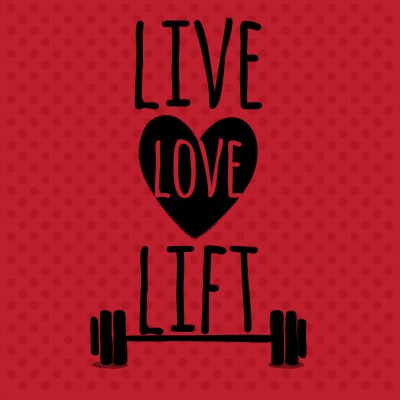 You can weight lift safely. A good strength training regimen covers all your major muscle groups. Focus on perfecting your technique with the big lifts to keep risk of injury to a minimum, while getting the greatest benefit for your time. Add some variety by then learning the accessory exercises you need for a well-rounded program.
You can weight lift safely. A good strength training regimen covers all your major muscle groups. Focus on perfecting your technique with the big lifts to keep risk of injury to a minimum, while getting the greatest benefit for your time. Add some variety by then learning the accessory exercises you need for a well-rounded program.
You can eat potatoes without blowing your macros. Not all tubers are created equal. If you want the best bang for your buck go for other options, like sweet potatoes. These have higher levels of antioxidants, including carotenoids, and vitamins C and E. They are also an excellent source of potassium, iron and fiber. A 225 gram serving of baked sweet potato supplies all your daily carotene requirements and most of your vitamin E needs.
Know that you get to decide how quickly you will achieve your goals.
You don’t need to break yourself to get benefits from resistance training. Many things in moderation are good for you, including weight lifting. For the best results starting out, aim for 8 to 12 repetitions for 3 to 5 sets at 75 percent of the maximum weight you can move. Be sure to rest between sets.
A little spud does you good.
Like many things in life, a little potato can be more benefit than none at all.
Choose healthier cooking options, like roasting and baking, and get the benefits of making chips and fries occasional indulgences only. Be aware that if you’re overweight or sedentary, you may not tolerate potatoes well, and you might like to choose other forms of resistant starch, like beans, corn or brown rice. And if you are active and finding your reduced intake of carbohydrates suits you well for a while but that you eventually become cranky, can’t sleep and your training suffers, it might be that you need to eat more.
[divider style="dashed" top="15" bottom="15"]
 Image Credit: Funnyquotesimg.com[/caption]
Image Credit: Funnyquotesimg.com[/caption]Wherever you are in your training career, at some point you’ll need to make the tough decision about whether the humble spud ( aka tater, tuber, po-teh-toe, po-ta-toe, etc ) is your friend or foe. You’ll need to consider whether these comforting carbohydrates will be part of your goals for general fitness, strength, power or endurance. Or will they be demonized and cast out, to be forever shunned?
Make this decision carefully because once you convince yourself of your position, it can be very hard to change your mindset.
As a self-confessed and long-term tater-hater, it took much effort to move to a better place. In this new and happy place baked potatoes (but only sweet potatoes) are happily chomped (but only after a tough training session when glycogen stores have been depleted), without much second thought (except for a momentary pang of guilt). I only said it was a happy place. I never said it was a simple and straightforward place.
To anyone who has never been carbohydrate phobic, you might not think this is progress. But I can tell you it is, and it was made possible by a group of women aged in their 40s and 50s who were learning to weight lift for the first time.
A few Reasons to Avoid the Humble Spud
We all go through phases of trying different things. It’s part of life and learning how stuff works, regardless of where we live, how old we are, how much money we make, and how many Twitter followers we have.
[caption id="attachment_20380" align="alignright" width="360"]
 The Love and Hate Relationship with Potatoes[/caption]
The Love and Hate Relationship with Potatoes[/caption]Conventional wisdom about carbohydrate consumption is diverse. Of the many paths available, some of us move further along the low carbohydrate and high protein path than we originally planned, without even realizing. We believe that we’ll easily shed fat and that our appetites will be reduced. We might set an arbitrary limit such as staying under 100 grams per day. What better way to achieve this than by giving up potato, pasta, rice and bread? For me, I focused on potatoes.
I made it easy on myself by believing the doctrine that:
- Potatoes change your body composition:
...this is a polite way of saying potatoes are not only filling, but they also make you fat. When you eat potatoes do you feel full? Potatoes make you feel full because they contain resistant starch. Also, potatoes in their most often consumed form of french fries will gram for gram have more calories than bread or rice.
- Potatoes weren’t meant to be eaten:
...did you know potatoes can be poisonous? The green patches you sometimes see contain solanine, which is a natural glycoalkaloid that occurs with exposure to light. It’s a bit hard sometimes to tell if they’re green under all that dirt. Maybe you should just avoid them all together.
- Potatoes are annoying to peel:
...this could fall into the group of first world problems, and I should be grateful to have ready access to food when many people in world don’t. While I don’t peel many other vegetables, it just feels right to make an exception for potatoes.
- Potatoes blow out your macros:
...if you’re monitoring your macronutrients and aiming for a certain breakdown of proteins, fats and carbohydrates, potatoes can easily blow out your balance, especially if you don’t have enough information to adjust as needed.
On review I’m sure you’ll agree these are very lame excuses on which to base an important nutritional decision. The only one that might get some sage nodding from you is the macronutrient argument, but only if you’re also already riding the train of macro monitoring, and only while we’re making polite conversation between sets at the gym.
4 Reasons women avoid weightlifting

Quite unrelated to the topic of potatoes, I recently started training a small group of women in their 40s and 50s. These Lovely Ladies had never been in a gym, let alone had the tough choice of whether to deadlift or squat on any particular day. These were women who were strong in so many ways, but were heading down the path of possibly not being able to be physically strong enough in the future to keep up with their families, their careers, or the lives they wanted to lead.
After our initial discussions about goals, training histories, and contraindications to training, we started to talk about whether they’d be interested in moving chunks of metal around for no other reason than to get strong and feel awesome. Their responses were the same I’d heard so many times before:
- weightlifting changes your body composition: it will bulk me up, and I’ll end up with chunky legs and no waist.
- women weren’t meant to weight lift: we’re built different to men.
- jostling for space in the gym is annoying: and not to mention intimidating, with all those big boofy blokes who could snap me like a twig.
- weightlifting can be dangerous: did you know the number one injury in gyms is from people dropping weights on their feet? Better to just avoid this risk.
Though I was very impressed with the conviction that the Lovely Ladies held their points of view, it was very disappointing to hear the same stories yet again.
[caption id="attachment_20386" align="aligncenter" width="618"]
 Image Credit: Meggorun.blogspot.ca
[/caption]
Image Credit: Meggorun.blogspot.ca
[/caption]But then I realized that their convictions against weight training were wrong only according to my point of view. Could my convictions against potatoes be just as wrong?
These Lovely Ladies changed my life when I realized their reasons for not weight lifting were almost exactly the same as my reasons for not eating potatoes.
5 Things to Know to Move from Loafing to Lifting, and from Tater-Hater to Rater
Enlightenment that results from a changed point of view can be rare, and when it happens it’s often useful to apply what you’ve learned to other parts of your life. Yes, perhaps to things more important than whether you eat potatoes, or whether you pick up chunks of metal for a couple of hours a week. These are the 5 things that the Lovely Ladies taught me and that everyone needs to know to make fitness changes.

1. Be open to new perceptions about your body composition
Know that you get to decide what your body will be like.
You will not get bulky from weightlifting. The benefits of women doing resistance training are well-known. You may become strong, capable and truly awesome, but you will not become bulky. You just won’t produce enough testosterone to make this happen. The truly great thing is that weight training for women need not be too different to weight training for men, and weight training for older people doesn’t need to be much different to weight training for younger folks. There are key principles that hold true for everyone, like the heavier the weights, the fewer the repetitions you should do. Also, be sure to give yourself time to recover, and find the ways you’ll love to train so you stay with it forever.
You will not get fat from eating potatoes. Potatoes are always going to contain carbohydrates. They fuel your activity. Along with proteins and fats, it’s these three macronutrients that keep you alive. They also contain other good stuff like vitamins C, B6 (folate), potassium, and some iron, protein and magnesium. Moderation through the amount you eat, and your preparation methods will decide whether you get fat or not.
2. Be willing to sometimes buck general wisdom and convention
 Know that you get to decide how much you want to conform to general convention.
Know that you get to decide how much you want to conform to general convention.Women are built to lift weights. Full stop. Older women also have the opportunity to correct some inconveniences associated with the ageing process, including hormone imbalances, slower metabolism, increased risk of osteoporosis, and loss of flexibility and muscle mass. You’ll also improve your cognitive functions including focus, conflict resolution and decision-making. Weightlifting can be as simple as you like. You can use your body weight at home, or you can choose a trainer or coach to tailor something exactly to your needs and personal circumstances.
You can eat green spuds. The green parts of potatoes may cause headache, nausea, fatigue and gastrointestinal issues, but you can avoid this problem by storing potatoes in a dark, cool, dry place. Or you can cut away the green parts before cooking and eating. There’s no need to discard your favorite tuber, because the white part is still safe to eat.
3. Understand that your goals may involve some inconvenience and sacrifice
Know that you get to decide the level of change and impacts you are willing to tolerate in achieving your goals .
You do not need to feel intimidated in the gym. Feeling uncomfortable in the gym is all about your level of understanding of what you need to do, and how the environment and etiquette works. The simplest way is not to give up. Go back. Ask for help. Don’t overwhelm yourself with information. Don’t just copy what others are doing. Live on the edge, and ask one of the big boofy blokes for help – most are really nice guys who are only too willing to share their wisdom. Do whatever it takes to get you back there. Everyone was a beginner at some stage of their training careers.
You do not need to peel potatoes. In fact it’s better if you don’t, because half of any potato’s fibre is in its skin. But if you just can’t get into potatoes unless you peel them, here’s what you do. Boil your potatoes as usual, then plunge them into cold water for 5 to 10 seconds. The skins should then be soft enough to peel with your bare hands.
4. Get the knowledge to make sure your goals are achievable
Know that you get to decide the knowledge you need to change your life.
 You can weight lift safely. A good strength training regimen covers all your major muscle groups. Focus on perfecting your technique with the big lifts to keep risk of injury to a minimum, while getting the greatest benefit for your time. Add some variety by then learning the accessory exercises you need for a well-rounded program.
You can weight lift safely. A good strength training regimen covers all your major muscle groups. Focus on perfecting your technique with the big lifts to keep risk of injury to a minimum, while getting the greatest benefit for your time. Add some variety by then learning the accessory exercises you need for a well-rounded program.You can eat potatoes without blowing your macros. Not all tubers are created equal. If you want the best bang for your buck go for other options, like sweet potatoes. These have higher levels of antioxidants, including carotenoids, and vitamins C and E. They are also an excellent source of potassium, iron and fiber. A 225 gram serving of baked sweet potato supplies all your daily carotene requirements and most of your vitamin E needs.
5. Moderation may mean you can be better and stronger for longer
Know that you get to decide how quickly you will achieve your goals.
You don’t need to break yourself to get benefits from resistance training. Many things in moderation are good for you, including weight lifting. For the best results starting out, aim for 8 to 12 repetitions for 3 to 5 sets at 75 percent of the maximum weight you can move. Be sure to rest between sets.
A little spud does you good.
Like many things in life, a little potato can be more benefit than none at all.
Choose healthier cooking options, like roasting and baking, and get the benefits of making chips and fries occasional indulgences only. Be aware that if you’re overweight or sedentary, you may not tolerate potatoes well, and you might like to choose other forms of resistant starch, like beans, corn or brown rice. And if you are active and finding your reduced intake of carbohydrates suits you well for a while but that you eventually become cranky, can’t sleep and your training suffers, it might be that you need to eat more.
[divider style="dashed" top="15" bottom="15"]




































































































